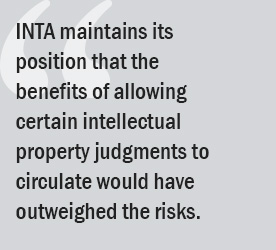Hague Judgment Convention Fails to Include Intellectual Property Provisions
Published: September 1, 2019
 After more than three years of discussion, the 22nd Diplomatic Session, held in The Hague, The Netherlands, finalized the Convention on the Recognition and Enforcement of Foreign Judgments in Civil or Commercial Matters (Convention). The Convention, which was adopted by more than 70 states and communities of states on July 2, 2019, expressly excludes intellectual property (IP) matters from its scope.
After more than three years of discussion, the 22nd Diplomatic Session, held in The Hague, The Netherlands, finalized the Convention on the Recognition and Enforcement of Foreign Judgments in Civil or Commercial Matters (Convention). The Convention, which was adopted by more than 70 states and communities of states on July 2, 2019, expressly excludes intellectual property (IP) matters from its scope.
INTA has long held that any final Convention of the Hague Conference on Private International Law on the international recognition and enforcement of judgments must contain provisions ensuring the maintenance, protection, and respect of the sovereignty of the ruling courts and the principle of territoriality of trademark rights and trademark judgments, particularly with regard to judgments ruling on the validity of trademarks.
The declared objective of this Convention was to “facilitate rule-based multilateral trade and investment, and mobility, through judicial cooperation” and to “facilitate the effective recognition and enforcement of such judgments.” In an increasingly borderless worldwide trade, the facilitation of the enforcement of judgments across borders is an important tool to ensure the protection of individual rights and compliance with obligations deriving from such trade relationships.
This decision follows lengthy and intensive discussions over the last three years about IP under the Convention. Side meetings and discussions led to significant amendments in the draft to ensure that especially the principles of territoriality and sovereignty regarding rulings on IP rights were protected. In addition, certain IP rights, such as patents, were excluded early on upon the reservations of some delegates.
Disagreement among delegates concerned issues such as the extent of harmonization and difference in sophistication of IP laws worldwide, the question of territoriality of decisions and the related concern with a transfer of such decisions to foreign courts, the courts’ scope of review of the decisions, the question of issue preclusion, and other specific IP-related details.
The delegates opposed to the inclusion of IP referred to stakeholder consultations, which seemed to indicate a lack of enthusiasm for the idea of having IP judgments “circulate”-meaning enabling a foreign judge to enforce compliance with the actionable parts of IP judgments outside the state of origin of the IP right. Several national and international member associations likewise opposed the inclusion of IP under the Convention. INTA, on the other hand, has supported the application of the Convention to IP judgments since early on, as is set out in INTA’s Board Resolution of September 2017.
Subsequent to the decision to exclude IP from the scope of the Convention, the remainder of the Diplomatic Session was focused on whether or not to include “analogous rights” in the exclusion text and to what extent, if any, contracts that touched on IP in any part, and which would be within the scope of the Convention pursuant to Article 5(1)(g), should be allowed to circulate.
The decision to exclude IP from the Convention was met with disappointment by a number of the delegates, including those from Brazil, Israel, and the EU, who favored the inclusion with restrictions to assure the protection of leading principles such as territoriality.
INTA, along with some of these delegations, made interventions during the plenary session to reiterate the benefits of including IP for brand owners in the fight to combat IP infringements across borders. Despite the fact that numerous other associations have opposed the coverage of IP contracts in the Convention, INTA maintains its position that the benefits of allowing certain IP judgments to circulate would have outweighed the risks.
Unfortunately, however, the opposing arguments brought forward by some stakeholders still contained considerable confusion as to the actual scope of the application of the Convention to IP judgments, which might have been avoided by providing additional information and clarifications to stakeholders, including trademark offices, preceding the substantive discussions. INTA stands by its position and considers the exclusion of IP a missed opportunity for brand owners.
The Council of the Hague Conference will be asked to decide whether to dedicate resources to the creation of a protocol to the Convention that would deal with IP as an opt-in solution in March 2020. It is unclear at this time whether there is any interest for renewed discussions about the topic, but one point most delegates can probably agree on is that, along with a potential protocol on IP judgments, efforts should be made to initiate discussions with stakeholders and IP authorities to raise awareness of the benefits of the Convention or a similar instrument for the global protection of IP rights.
INTA will continue monitoring this issue and informing its members on any further developments.
Although every effort has been made to verify the accuracy of items in the INTA Bulletin, readers are urged to check independently on matters of specific concern or interest.
© 2019 International Trademark Association